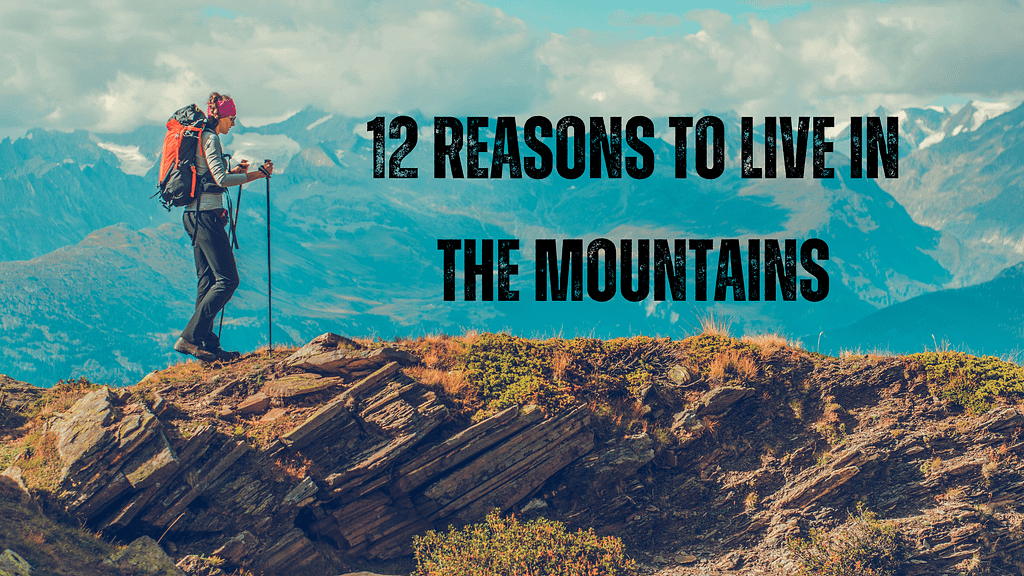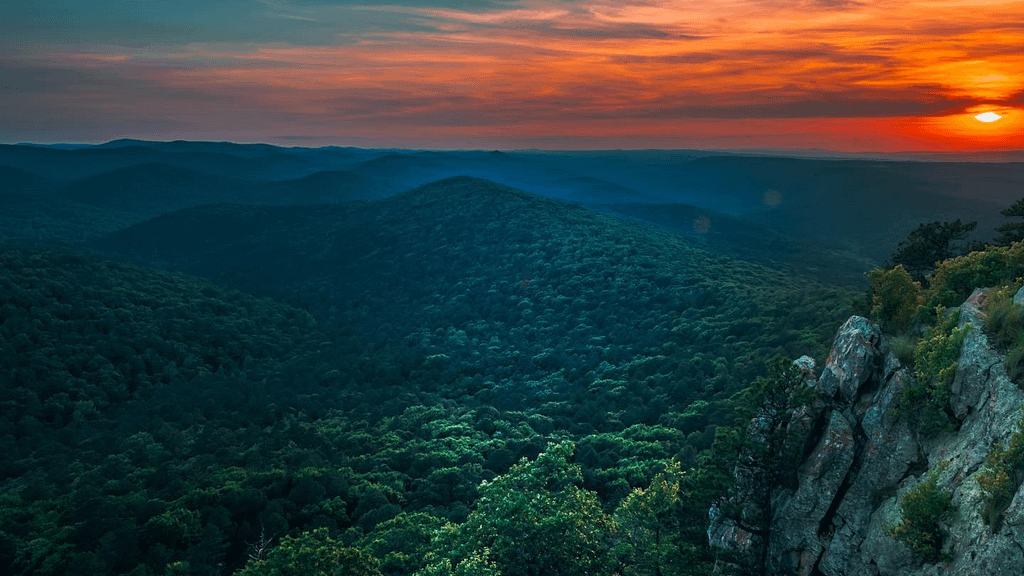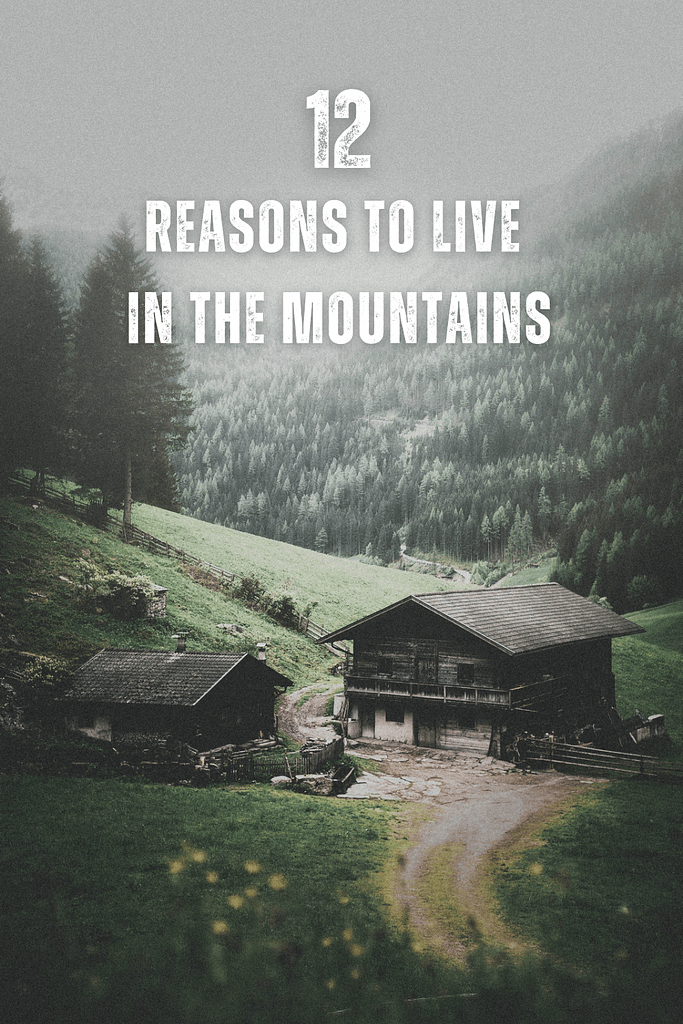
Living in the mountains is beneficial for numerous reasons, primarily due to the enhanced quality of life it offers. The fresh, clean air and stunning natural surroundings promote physical health and mental well-being, reducing stress and fostering relaxation. Access to outdoor activities like hiking, skiing, and wildlife watching encourages an active lifestyle, while the slower pace of life allows for deeper connections with nature and the community. Additionally, the scenic beauty and tranquility of mountainous environments provide a sense of peace and fulfillment, making it an ideal setting for those seeking a retreat from the fast-paced demands of urban living. Let’s take a look at twelve reasons to live in the mountains.
Mountain Fresh Air
Mountain fresh air is widely regarded as beneficial due to its purity, higher oxygen content, and lower levels of pollution compared to urban environments. At higher altitudes, the air is typically free from industrial pollutants, allergens, and other airborne irritants, which can improve respiratory health and ease breathing. The crisp, clean air in mountainous areas also has a refreshing effect on the body and mind, promoting relaxation and reducing stress. Additionally, higher oxygen levels and cooler temperatures can enhance physical endurance, improve mood, and boost mental clarity. These unique qualities of mountain air contribute to a sense of rejuvenation and well-being for those who spend time in such environments.
Scenic Views

Scenic views are soothing because they engage our senses in a peaceful and harmonious way, allowing the mind to relax and the body to feel at ease. Natural landscapes—such as mountains, oceans, forests, and sunsets—create a sense of awe and beauty that draws our attention gently, without overwhelming us. Studies have shown that being in nature or even viewing natural scenery can lower stress hormones, reduce blood pressure, and improve mood. The organic shapes, colors, and patterns found in nature are calming, especially compared to the often harsh, rigid structures of urban life. Scenic views can also create a sense of perspective and wonder, helping us feel more connected to the world and fostering a sense of peace and tranquility.
Peace and Quiet
Living in the mountains offers peace and quiet, which has profound benefits for both mental and physical health. The absence of urban noise pollution—from traffic, construction, and crowds—allows the mind to relax and recover from constant stimulation, reducing stress levels and enhancing mental clarity. This quiet environment encourages mindfulness and introspection, making it easier to focus on personal well-being and cultivate a sense of inner calm. Additionally, studies show that a peaceful setting can lead to improved sleep quality, lower blood pressure, and enhanced immune function. The natural sounds of the mountains—such as rustling leaves, birdsong, and flowing streams—create a soothing background that can further alleviate anxiety and improve mood, making mountain living a sanctuary for those seeking a balanced and healthier lifestyle.
Wildlife Watching

Wildlife watching in the mountains is beneficial because it connects people to nature, fostering a sense of wonder, appreciation, and tranquility. Observing animals in their natural habitat can reduce stress, boost mood, and enhance mindfulness, as it encourages people to focus on the present moment. Watching wildlife also offers unique learning opportunities, as it reveals the intricacies of natural ecosystems and animal behaviors, helping people develop a deeper respect for biodiversity. Additionally, the slow-paced, quiet nature of wildlife observation promotes relaxation, allowing people to fully immerse themselves in the peaceful mountain environment.
Stargazing
Stargazing is significantly easier for those who live in the mountains due to the elevated altitude and reduced light pollution typically found in these areas. Higher elevations often mean clearer skies, as the thinner atmosphere allows for less obstruction of celestial views. Additionally, mountain locations are often far removed from the bright lights of urban centers, resulting in darker night skies that enhance the visibility of stars, planets, and other astronomical phenomena. The natural beauty of the mountainous landscape provides a stunning backdrop for stargazing, allowing for a peaceful and immersive experience. As a result, living in the mountains not only offers the opportunity to observe constellations and meteor showers more easily but also fosters a deeper connection to the cosmos and a greater appreciation for the wonders of the universe.
Outdoor Recreation
The mountains offer a wide range of outdoor recreation opportunities that provide both physical and mental benefits. Activities like hiking, mountain biking, rock climbing, and skiing challenge the body, building strength, endurance, and balance while allowing individuals to experience breathtaking natural landscapes. For those seeking a more tranquil experience, fishing, birdwatching, or simply walking through mountain trails provide relaxation and a chance to connect with nature. The variety of outdoor pursuits available in mountainous areas caters to people of all ages and fitness levels, making it easy to find activities that suit individual preferences. Beyond fitness and relaxation, spending time in mountain environments encourages a sense of adventure, discovery, and fulfillment, creating lasting memories and promoting a healthy, active lifestyle.
Experience the Four Seasons
Life in the mountains allows residents to experience the distinct beauty and charm of all four seasons, each bringing its own unique character and outdoor opportunities. Spring transforms the landscape as wildflowers bloom and snow melts, creating vibrant meadows and rushing streams. Summer offers warm days perfect for hiking, camping, and mountain biking, as the lush greenery and clear blue skies provide a stunning backdrop for outdoor adventures. Autumn captivates with a breathtaking display of fall foliage, as trees don hues of orange, red, and gold, creating a picturesque setting. Finally, winter blankets the mountains in snow, turning the region into a paradise for skiing, snowboarding, and cozy nights by the fire, making it a seasonal wonderland that delights residents throughout the year. Each season in the mountains enriches the living experience, offering endless opportunities for exploration and appreciation of nature’s ever-changing beauty.
Natural Exercises

Natural exercises in the mountains, like hiking, trail running, and climbing, are excellent for the body due to their unique combination of strength, endurance, and cardiovascular benefits. The varied terrain requires muscles to adapt constantly, building strength in the legs, core, and stabilizing muscles that aren’t as engaged on flat surfaces. Exercising at higher altitudes also provides additional health benefits, as the lower oxygen levels prompt the body to increase red blood cell production, improving oxygen efficiency and cardiovascular endurance. The fresh mountain air, low in pollutants, enhances breathing, while the cooler temperatures can help reduce inflammation and muscle fatigue. Additionally, the mental boost from being surrounded by beautiful, natural landscapes supports overall well-being, making mountain-based exercise a rejuvenating, full-body workout.
Slower Pace of Life
Mountain life often leads to a slower pace of life because the natural environment encourages mindfulness, simplicity, and a stronger connection to nature. Far removed from the hustle and bustle of urban areas, mountain communities generally focus less on fast-paced, technology-driven lifestyles and more on personal relationships, outdoor activities, and self-sufficiency. Daily routines in the mountains are often shaped by the rhythms of nature—weather patterns, changing seasons, and daylight—which fosters a greater sense of patience and adaptability. This lifestyle promotes a more intentional approach to work and leisure, allowing individuals to appreciate simple pleasures and focus on overall well-being rather than constant productivity. As a result, living in the mountains encourages a peaceful, unhurried way of life that many find deeply rewarding.
Mindfulness and Reflection

Living in the mountains provides a unique opportunity for mindfulness and reflection, as the tranquil environment encourages individuals to slow down and fully engage with their surroundings. The breathtaking landscapes, fresh air, and soothing sounds of nature create an ideal backdrop for introspection and self-discovery. Many residents find that activities such as hiking, meditating, or simply enjoying the view allow them to connect deeply with their thoughts and emotions. The slower pace of life in the mountains fosters a sense of awareness, helping individuals appreciate the beauty of each moment and encouraging personal growth. This focus on mindfulness not only enhances mental clarity but also promotes a greater sense of well-being, making mountain living a nurturing experience for the mind and spirit.
Health Benefits
This type of lifestyle tends to offer numerous health benefits that contribute to both physical and mental well-being. The clean, fresh air is free from the pollution commonly found in urban areas, which can lead to improved respiratory health and overall vitality. Regular access to outdoor activities, such as hiking, skiing, and mountain biking, encourages an active lifestyle that enhances cardiovascular fitness and builds strength. Moreover, the breathtaking natural scenery and tranquil environment help reduce stress levels, promoting mental clarity and emotional resilience. As those who live in the mountains immerse themselves in nature, they often experience increased mindfulness and a greater sense of connection to their surroundings, which further supports mental health. Overall, the combination of physical activity, clean air, and serene landscapes makes living in the mountains a holistic approach to health and wellness.
Closeness of Community
When a person lives in the mountains, the closeness of community becomes a defining aspect of life. The shared experiences of mountain living, from navigating harsh winters to celebrating local traditions, foster deep connections among residents. In small, tight-knit communities, neighbors often rely on one another for support, creating a strong sense of trust and belonging. Regular gatherings, such as farmers’ markets, festivals, or group hikes, provide opportunities for meaningful interactions and the formation of lasting friendships. The slower pace of mountain life also allows people to prioritize relationships and spend quality time with others. This spirit of collaboration and camaraderie makes mountain communities uniquely close, offering not just a place to live but a network of support and shared purpose that enriches daily life.


